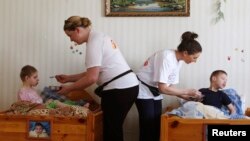Children with disabilities in the developing world are frequently subjected to severe emotional and physical punishment, according to an analysis of data compiled by UNICEF, the United Nations Children’s Fund.
An estimated 93 million children around the world have disabilities, including emotional, developmental and physical impairments. Eighty percent of them live in middle- and low-income countries, and, according to experts, are subject to harsh discipline.
Investigators from Duke University and the National Institutes of Health combed through surveys collected by UNICEF of almost 46,000 parents and caregivers of children between the ages of two and nine in 17 of those countries. Some mentioned are Bosnia-Herzegovina, Cameroon, Central African Republic, Georgia, Ghana, Iraq, Laos and Yemen. It was the largest study to date on the treatment of children with cognitive, physical, sensory and motor disabilities.
About four percent of disabled youngsters in poorer nations received severe treatment, according to researcher Jennifer Lansford of the Family and Child Policy Center at Duke University in North Carolina.
She said the harshest forms of punishment included beating the child on the head with a stick or heavy object. “And then we had a range of other physical and non-physical forms of punishment, including spanking the child, shaking the child, calling the child lazy and stupid and things like that,” said Lansford.
Among the countries surveyed, only in Georgia were punitive caretakers not the norm.
Lansford said it is not clear whether some of the severe interactions, including shaking the children, contributed to their disabilities.
To explain the harsh punishments, Lansford said many caregivers cited stress and frustration… “Related to managing the disability as well as knowing how to parent a child with disabilities, so that a higher levels of stress could lead to harsher parenting for sure,” stated Lansford.
Lansford said programs that educate caretakers about disabilities, and encourage them to take a break when they feel particularly stressed out, could lead to more positive parenting.
An article on the harsh treatment of children with disabilities in developing nations is published in the journal Child Development.
An estimated 93 million children around the world have disabilities, including emotional, developmental and physical impairments. Eighty percent of them live in middle- and low-income countries, and, according to experts, are subject to harsh discipline.
Investigators from Duke University and the National Institutes of Health combed through surveys collected by UNICEF of almost 46,000 parents and caregivers of children between the ages of two and nine in 17 of those countries. Some mentioned are Bosnia-Herzegovina, Cameroon, Central African Republic, Georgia, Ghana, Iraq, Laos and Yemen. It was the largest study to date on the treatment of children with cognitive, physical, sensory and motor disabilities.
About four percent of disabled youngsters in poorer nations received severe treatment, according to researcher Jennifer Lansford of the Family and Child Policy Center at Duke University in North Carolina.
She said the harshest forms of punishment included beating the child on the head with a stick or heavy object. “And then we had a range of other physical and non-physical forms of punishment, including spanking the child, shaking the child, calling the child lazy and stupid and things like that,” said Lansford.
Among the countries surveyed, only in Georgia were punitive caretakers not the norm.
Lansford said it is not clear whether some of the severe interactions, including shaking the children, contributed to their disabilities.
To explain the harsh punishments, Lansford said many caregivers cited stress and frustration… “Related to managing the disability as well as knowing how to parent a child with disabilities, so that a higher levels of stress could lead to harsher parenting for sure,” stated Lansford.
Lansford said programs that educate caretakers about disabilities, and encourage them to take a break when they feel particularly stressed out, could lead to more positive parenting.
An article on the harsh treatment of children with disabilities in developing nations is published in the journal Child Development.




